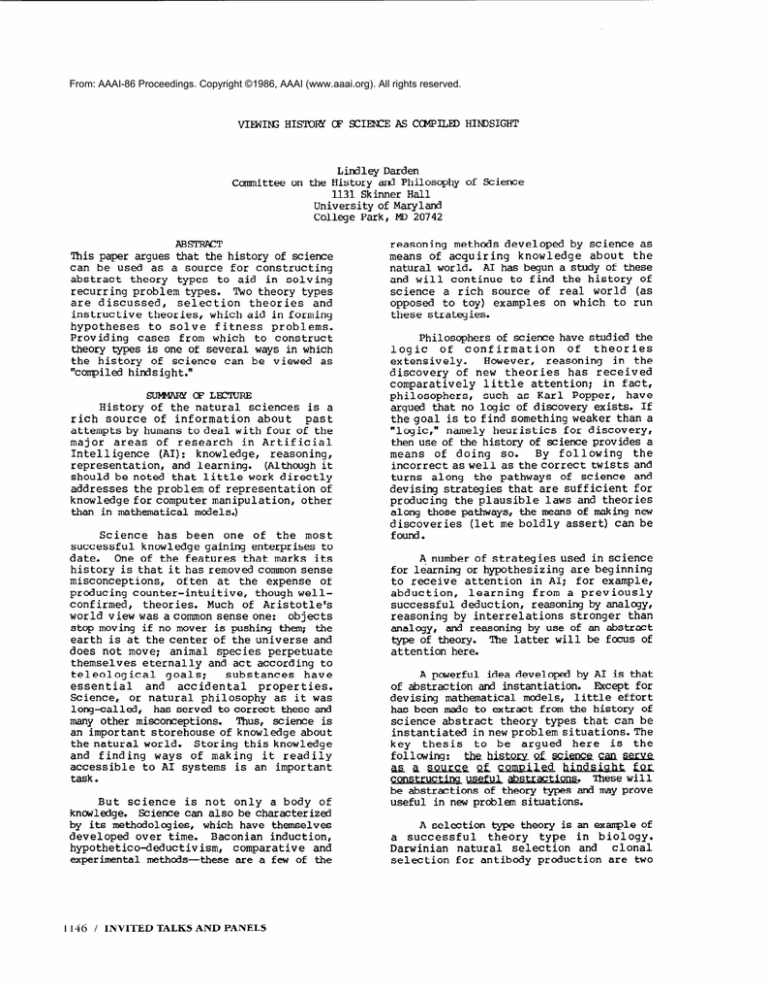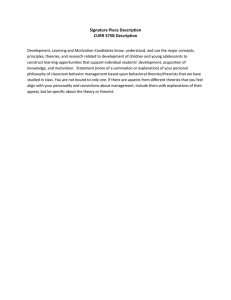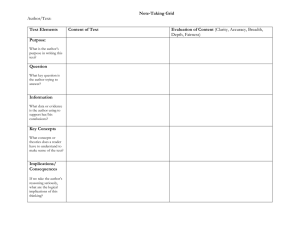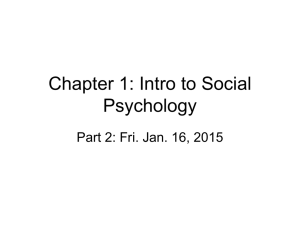
From: AAAI-86 Proceedings. Copyright ©1986, AAAI (www.aaai.org). All rights reserved.
VIEWINZ HISTOm OF SCIENCEAS CCNPILEDHINDSIGHT
LindleyDarden
Coxnnittee
on the History and Philosophyof Science
1131 SkinnerHall
Universityof Maryland
CollegePark, MD 20742
ABSmT
This paper argues that the history of science
can be used as a source for constructing
abstract theory types to aid in solving
recurring problem types. Two theory types
are discussed, selection theories and
instructive theories, which aid in forming
hypotheses to solve fitness problems.
Providing cases from which to construct
theory types is one of several ways in which
the history of science can be viewed as
"compiledhindsight."
SUMMARYOPLECIURE
History of the natural sciences is a
rich source of information about past
attempts by humans todealwith four of the
major areas of research in Artificial
Intelligence (AI): knowledge, reasoning,
representation, and learning. (Althoughit
should be noted that little work directly
addresses the problem of representation of
knowledge for computer manipulation, other
than in mathematicalmodels.)
Science has been one of the most
successful knowledge gainingenterprisesto
date. One of the features that marks its
history is that it has removed common sense
misconceptions, often at the expense of
producing counter-intuitive, though wellconfirmed, theories. Much of Aristotle's
world view was acommon sense one: objects
stop moving if no mover is pushing them; the
earth is at the center of the universe and
does not move; animal species perpetuate
themselves eternally and act according to
teleological goals;
substances have
essential and accidental properties.
Science, or natural philosophy as it was
long-called, has served to correct these and
many other misconceptions. Thus, science is
an important storehouse of knowledge about
the natural world. Storing this knowledge
and finding ways of making it readily
accessible to AI systems is an important
task.
But science is not only a body of
knowledge. Sciencecan also be characterized
by its methodologies,which have themselves
developed over time. Baconian induction,
hypothetico-deductivism, comparative and
experimental methods-these
are a few of the
1146 / INVITED
TALKS
AND PANELS
reasoning methods developed by science as
means of acquiring knowledge about the
natural world. AI has begun a study of these
and will continue to find the history of
science a rich source of real world (as
opposed to toy) examples on which to run
these strategies.
Philosophersof sciencehave studiedthe
of theories
of confirmation
logic
extensively. However, reasoning in the
discovery of new theories has received
comparatively little attention; in fact,
philosophers, such as Karl Popper, have
argued that no logic of discovery exists. If
the goal is to find something weaker than a
"logic," namely heuristics for discovery,
then use of the history of scienceprovides a
means of doing so. By following the
incorrectaswell as thecorrect twists and
turns along the pathways of science and
devising strategiesthat are sufficient for
producing the plausible laws and theories
along those pathways,themeans of making new
discoveries (let me boldly assert) can be
found.
A number of strategies used in science
for learningor hypothesizing are beginning
to receive attention in AI; for example,
abduction, learning from a previously
successful deduction, reasoningby analogy,
reasoning by interrelations stronger than
analogy, and reasoningby use of an abstract
type of theory. The latter will be focus of
attention here.
A powerful idea developed by AI is that
of abstractionand instantiation.Except for
devising mathematicalmodels, little effort
has been made to extract from the history of
science abstract theory types that can be
instantiated in newproblem situations.The
key thesis to be argued here is the
following: kllehistorvd science=as
a
aam .
af
cau2iLs2CL
l&d&U
fer
constructinQusefu1abstractiow These will
be abstractionsof theory types h may prove
useful in new problem situations.
A selectiontype theory is an example of
a successful theory type in biology.
Darwinian natural selection and clonal
selection for antibody production are two
The abstraction of
instantiations.
variation,interaction,and perpetuation of
the most fit variant is an important theory
type available only since the middle of the
nineteenthcentury.
an alternative
to
Historically,
selection theories for solving fitness
problems that predated selection is the
instructivetype theory in which information
is used to generate, not a random set of
variants, but ones that already are fit.
Neo-Lamarckian inheritance of acquired
characteristics is an example of a form
adapting and that form being perpetuated
without random variation and selection. The
template theory of antibody formation is
another example of an instructive type
theory. Neither of the instructivetheories
was confirmed historically. Since the
d&confirmed theoriesprovided a theory type,
this case illustrates what historians of
sciencehave long been arguing: the study of
disconfirmed,as well as confirmed,theories,
the incorrectreasoningpaths as well as the
successfulones, is important.
The campiled hindsightfrom the study of
selection and instructive theories is the
following: find a current problem in which
one thing is to change over time to fit
another thing; devise good abstractions of
the theory types for fitnessproblems,namely
theories;
selection
and instructive
instantiate those abstractions in that
problem situationto provide solutions; test
the solutions; note whether the selection
theory is again successful.
this work. The phrase "compiled hindsight"
is taken from (Lenat,1983).
REFWES
Darden, Lindley, and Nancy Maull. 1977.
"Interfield Theories."Paosmhypf
Science
44~43-64.
Darden, Lindley. 1983. "Reasoningby Analogy
in Scientific
Theory Construction."
.
Proc&iinw
af m
International Machine
Monticello, Illinois,
Darden, Lindley, and Rada, Roy. 1986.
"Hypothesis Formation via Interrelations."
Pbzxedius
af
AsiaaLag.ka
l!i5,
Rutgers
University, New Brunswick, New Jersey,
forthcoming.
Lenat, Douglas.
1983.
"The Role of
Heuristicsin Learning by Discovery: Three
Case Studies." Mm
Learning. Wited by
R. Michalski, J. Carbonell, and T. Mitchell.
Palo Alto, California: Tioga PublishingCo.
Pages 243-306.
Langley, Pat, Jan Zytkow, Gary Bradshaw,
Herbert Simon. 1983. "Three Facets of
Scientific Discovery." Proceedins af ti
.
EM
Intern&Ion&
JointConferencem
A,Ef;ificiu InteLuaence, Harlsruhe, West
Germany, v.1. Pages 465-468.
Popper, Karl. 1965. W Loaic;&Scientific
Ddoverv.
New York: Harper Torchbooks.
In conclusion, a research program
emerges: study the history of science to
find recurring problem types and theory
useful
types; devise computationally
abstractions for them; and build AI systems
to use such compiled hindsight. Successwith
such a program of research would show the
usefulnessof interfieldinteractions
between
the history of science and artificial
intelligence.
Lindley Darden gratefully acknowledges the
support of the University of Maryland
Institutefor Advanced Computer Studies for
INVITED
TALKS
AND PANELS
/
1147






